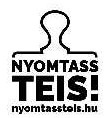
We kindly inform you that, as long as the subject affiliation of our 300.000+ articles is in progress, you might get unsufficient or no results on your third level or second level search. In this case, please broaden your search criteria.

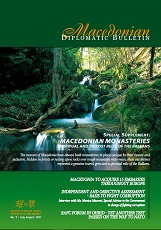
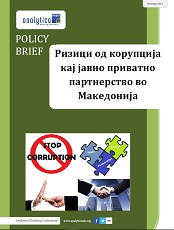
Борбата со корупцијата е горливо прашање за Република Македонија. Европска комисија во последниот извештај за напредок констатира дека корупцијата и понатаму продолжува да постои во многу области и дека корупцијата во јавните набавки е сериозен проблем. Понатаму, корупцијата на локално ново во Република Македонија е недоволно истражена, а и јавната доверба во институциите надлежни за справување со корупција е ниска, па затоа е важно поактивно вклучување на граѓанскиот сектор во мониторирање на трошењето на јавните пари како и континуирано истражување на областа, со цел да се придонесе кон зајакнување на доброто владеење во државата.
More...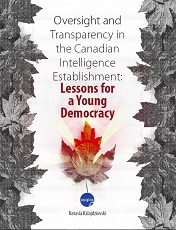
Intelligence as statecraft has been a long-practiced and embraced manner for nation-states to gather information about both their enemies and allies in equal measure. However, as intelligence practice has become more formalized throughout the past century, new expectations relating to the openness and transparency of intelligence actors – especially those operating in liberal democratic states – came to the fore. There is now an expectation of acknowledgement from intelligence actors toward their populaces about their mandates, purpose, and activities; this is accomplished through both greater efforts at transparent dialogue between the two bodies, but also through comprehensive oversight mechanisms – mechanisms which are put in place to ensure that the activities of intelligence actors remain within their legislative remit and within the law.
More...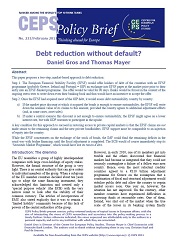
Despite the growth of lobbying in the EU over thepast two decades, the EU has taken a rather laissez faire approach to regulating lobbying activity. While the European Parliament (EP) is in many ways more transparent and more accessible than many of the EU’s national parliaments, the code of conduct for lobbyists and the Parliament’s own rules of procedure are rather vague. As a result of the ‘cash for laws’s candal, the EP President, Jerzy Buzek, has established a working group to draw up a new set of rules to govern the access and behaviour of lobbyists and to formulate a code of conduct for Members of the European Parliament (MEPs).
More...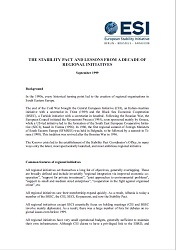
Six years after the end of the fighting in BiH, and despite possibly the largest amount of democratization assistance per capita ever spent in one country, the international mission to BiH has arrived at this paradoxical conclusion: What Bosnia and Herzegovina needs is not democratic domestic politics, but government by international experts.
More...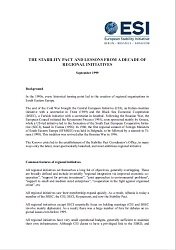
There are very few fellow members of the Parliamentary Assembly of the Council of Europe (PACE) who have been to Azerbaijan as regularly over the past decade as Pedro Agramunt, the conservative Spanish senator, a businessman from Valencia. Agramunt has been consistent in this approach to Azerbaijan: from the very beginning of his relationship with Baku he has been a defender of the Aliyev regime. The latest monitoring report is his masterpiece. || The Agramunt/Grech report is supposed to assess whether Azerbaijan, as a member of the Council of Europe since 2001, has fulfilled the commitments it took upon itself when it joined the organisation. In fact, it is a sophisticated effort to hide a simple truth, a portrait of deception: in all areas a democracy cannot do without – from free and fair elections to freedom of speech, freedom of assembly or basic political and human rights, including the rule of law through an independent judiciary – the situation in Azerbaijan, already terrible a decade ago, is even worse today.
More...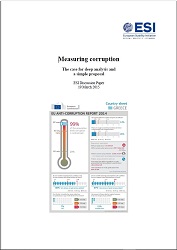
In its annual progress reports the European Commission offers descriptions of the institutional and legal infrastructure that play a role in combatting corruption in the seven accession countries. Such analysis matters: flawed laws, under-resourced institutions and ill equipped officials will obviously generate problems. But studying and improving the institutional and legal infrastructure is not an end in itself: its ultimate purpose is to change behavior. Even the best anti-corruption agency and even the most eloquent anti-corruption action plan are only the means to an end, not the end itself. || This raises the question of assessment of impact. Can the actual incidence of corruption in different walks of social life be fairly established? Can the impact of anti-corruption reforms be captured, measured, and the outcomes compared? || ESI believes that the European Commission has a powerful tool at its disposal to do just this. It is, however, a tool that is not currently used in the context of accession.
More...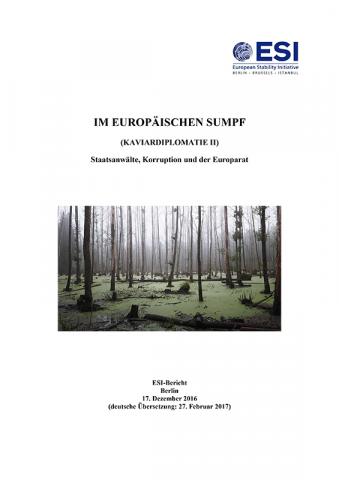
Can basic international norms be undermined by corruption? Can international politics be fundamentally reshaped by the personal greed of politicians? These are among the most important questions in global politics today. When it comes to the Council of Europe, guardian of the European Convention of Human Rights and, since its creation in 1949, the leading intergovernmental human rights institution in the world, the answer to both questions is yes.In this follow-up to Caviar Diplomacy, we take a closer look, four years later, at the progress that has been made on miring the Council of Europe in a swamp of corruption. This time we provide the names of members of the parliamentary assembly who paid bribes – including Elkhan Suleymanov, the mastermind behind this policy in Strasbourg. We describe in detail how the corruption of MPs proceeded, from early visits with precious gifts meant to test the beneficiaries’ reactions, to long-term contracts involving huge sums of money. In the third part in this series we will offer specific recommendations for what to do next.
More...
Beograd danas nema ništa od onog što je davnog 12. aprila 2012. Aleksandar Vučić prvi put najavio u svom predizbornom obećanju, lansirajući ideju o urbanističkoj formaciji koja bi u bliskoj budućnosti mogla da ispuni Savski amfiteatar. Umesto blistavog Beograda na vodi, prestonica je dobila dva betonska kolosa, koji su kao tumor iznikli nauštrb urbanističke okoline. Od silnih najavljivanih objekata projektovani Belgrade Waterfront dobio je samo tzv. Kulu A. I ta Kula A dobila je prve stanare, koji su predstavljeni građanstvu kao mnogočlane porodice srpskog porekla, koje su u interkontinentalnom biznisu zaradile velika sredstva, koja su sa zadovoljstvom uložile u stambene jedinice na obali Save. Bilo je samo pitanje vidika, hoće li gledati na reku ili na devastiranu Savamalu, na sravnjene zgrade u Hercegovačkoj, na počupane objekte bivše Lastine autobuske stanice, na Beogradsku autobusku stanicu u terminalnoj fazi raspadanja ili možda na avetinjske pejzaže bivše Glavne železničke stanice.
More...
„Policajci su zveri u uniformi. Oni su se sveli na mentalni stepen novorođenčadi, zahvaljujući zahvatu `španska kragna`, koji uče i praktikuju sa brutalnom spontanošću, umesto da se prema ljudima odnose razborito i brižno”. „Njihovo ponašanje je tako tipično za ono što postepeno postaje javni imidž policijskih snaga, od koga se brane maltretiranjem, lažiranjem, protivpravnim akcijama, sujeverjem, prenagljenošću i neukošću.“ Ne, ovo nije izrekla niti napisala Vesna Pešić, novinarka ovdašnja. Ne, ove rečenice nikad do sad nisu bile objavljene na sajtu Peščanika. Njih je zapisao književnik Thorgeir Thorgeirson, građanin Islanda. Objavljene su u dva članka dnevnog lista Morgunbladid od 7. i 20. XII 1983. (videti presudu Evropskog suda za ljudska prava, pritužba br. 13778/88 od 25. VI 1992, §§ 14. i 15). Zbog ovih rečenica Thorgeirson je bio optužen i konačno osuđen da plati novčanu kaznu. Odluku je potvrdio Vrhovni sud Islanda. Ali Thorgeirson (da li zbog prirođene protestantske etike, da li od duga vremena, ili usled lične upornosti) se sa osudom nije pomirio, već se obratio Evropskom sudu za ljudska prava.
More...
Ministar policije i Nebojša Stefanović tužili su Vesnu Pešić i Peščanik zbog teksta „Dosoljavanje“ od 14.05.2016. Ministru policije, Vesna Pešić i Peščanik povredili su „poslovnu čast i ugled“, dok je Nebojša Stefanović zbog objavljivanja „neistinitih informacija“ pretrpeo „duševni bol, zbog povrede ugleda, časti, slobode i prava ličnosti“, te „zbog stvaranja neistinite i pogrešne predstave o njegovoj ličnosti“. Tako su Vesna Pešić i Peščanik ministru policije i Nebojši Stefanoviću „pričinili štetu najvećeg stepena“. Kao tužilac se ipak potpisalo samo privatno lice Nebojša Stefanović (treba se nadati da ministar policije ima preča posla od podnošenja tužbi protiv građana), iako je Vesna Pešić pisala isključivo o ministru policije (dakle, i kada je pominjala Stefanovića, pominjala ga je jedino kao ministra policije).
More...
Vučić je pobedio na vanrednim izborima, ali se iz čudnih razloga i dalje rasplamsava ljuta borba protiv Demokratske stranke. U sred afere Savamala iz koje ne zna kako da ispliva, a nekako mora, Vučić je bacio bombu kako će njegovi podići spomenik Zoranu Đinđiću 2018. na Studentskom trgu. DS se nije setila da to učini, pa eto, ko će drugi popraviti grešku nego Vučić i SNS. U nervozi oko Savamale i u uta-ta stilu nekako je ispalo da taj spomenik treba da posluži kao glavno oružje u konačnom obračunu sa građanskom Srbijom, a izgleda i samim Đinđićem. Otećemo vam i tog Đinđića. Kad jednom padne u naše šake i kad ga unakazimo, a tek ćete videti kako ćemo da vam zapržimo čorbu sa Legijom i drugovima.
More...
Danas je 25.maj. Prošlo je tačno mesec dana od događaja koji je kao retko koji u poslednje vreme zatalasao našu javnost, a o čijim akterima, je nažalost izostala bilo kakva ozbiljna, relevantna informacija. Isto kao i o aktivnostima nadležnih čiji bi rezultat trebalo da bude “rasvetljavanje” ovog mračnog događaja. Mislim, razume se, na noćnu akciju koju su ljudi pod “fantomkama” sproveli u Savamali rušeći više zgrada u površini od preko hiljadu metara kvadratnih, izvršivši pritom više krivičnih dela. U međuvremenu, međutim, stižu i neke nimalo željene informacije.
More...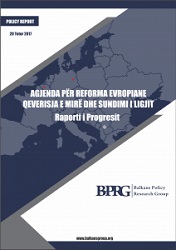
European Reform Agenda (ERA) was introduced as an attempt to increase the attention of the Kosovo Government on pressing issues, related to the Good Governance and Rule of Law; Competitiveness and Investment Climate; Employment and Education. The government recognizes ERA as an important reform generator. Initiated by EU Commissioner for European Neighborhood Policy and Enlargement Negotiations (DG NEAR), Johannes Hahn, ERA is also a high-level dialogue between Kosovo and the EU. The document was designed to streamline priority reforms that would improve the performance of institutions and hopefully accelerate the Kosovo’s slow-paced progress toward EU. Yet, almost a year after the launch little was achieved. The institutions were remarkably passive on implementing the priorities and actions. Deadlines in the agenda (action plan) are largely missed. Implementation has slipped for numerous reasons and the process reflects on the weakness of the institutions; lack of will and coordination are key. ERA needs a new momentum; the government should press on the full implementation with a priority and adopt a new timetable.
More...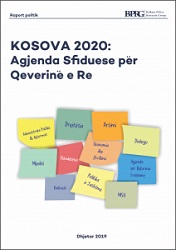
The new government that takes office, whatever its colour will inherit a long list of issues from its predecessor. Dysfunctional healthcare and education systems, an untaxed shadow economy, a slow and often ineffective judiciary, weak public administration all require major interventions. The failure of public services is graphically illustrated with the high number of patients being treated abroad and the regular enrolment of politicians’ children in private and international schools.17 To further complicate the matter, despite the generally cordial campaign that preceded the elections, relations between key political actors remain tense; leaders do not trust each other and basic norms of cooperation between actors are still missing. That is especially true for the case of Albin Kurti, the leader of Vetëvendosje, who has spent much of his time in opposition (and before that, as an activist) attacking other parties, including his current potential partner LDK. If Kurti aims to secure the premiership and stay in power he will have to build some relations with both his coalition partner and the opposition, with whom he never tried to reconcile. Any new government will have to create a favourable climate to enact the promised reforms. In the case of Kurti, especially, that would entail making a U-turn and engaging with the opposition from day one. These priorities for the new government listed in this report do not intend to be comprehensive, but to present an outline of the more pressing issues the government will need to work on to ensure progress is made. The composition of the government, domestic politics and international developments can also influence how a priority is defined. Yet, these issues require careful attention and will not disappear from the public agenda in the short term.
More...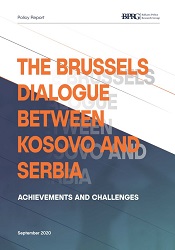
This report describes the dialogue process in detail; the achieved agreements, their implementation or lack of thereof, and the impact of these agreements. The report treats both technical and political agreements as part of a single process eased by the EU’s involvement. Since the government and other institutions do not have complete information regarding the entire dialogue, this report will serve to create a better institutional memory system for the Government. These descriptions are also significant for the new dialogue phase with Serbia.
More...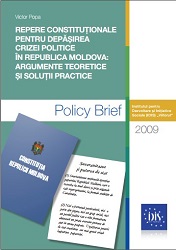
This study is an attempt to signal a situation of constitutional conflict, manifested by the accumulation of incompatibilities of holding political and administrative mandates, in the context of the crisis after the elections of April 5, 2009. Reactions to events and legal nihilism of some high state officials have produced effects, which the Constitutional Court, together with the political class of the Republic of Moldova, must resolve, at this moment, in order not to turn the mistakes committed, rigorously analyzed in the following, into a dramatic episode, denial, or even suspension of the Constitution. // In particular, this study shows the existence of effects produced by the adoption of unconstitutional decisions, including related to the election of the President of the Parliament, and at the same time, the retention of the position of President of the Republic of Moldova by one and the same person, coming in flagrant contradiction. with the provisions of the Constitution and the law on the status of the deputy in the Parliament. In particular, the author considers it opportune to annul the decision to validate the elections for the position of President of the Republic of Moldova on 3.06.09 and the second round in accordance with the provisions of the Constitution and the Law on the procedure for electing the President of the Republic of Moldova.
More...
The verdict of the War Crimes Chamber of the Belgrade District Court against Scorpios accused of killing six Bosniak civilians in Trnovo, BiH, in July 1995, issued on April 10, 2007, is not based on law and facts established during the evidentiary proceedings. It seems that the court was guided by political and not legal reasons, in order to adjust to the attitudes of the Serbian authorities regarding the responsibility for the Srebrenica genocide in the context of the International Court of Justice ruling and show understanding for the patriotic orientations of some Scorpios.
More...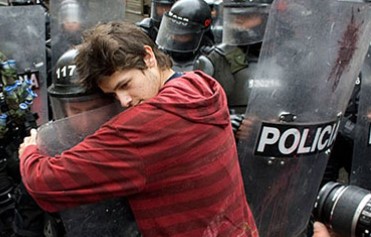
Kad god vidim gomilu naroda na televiziji ili u novinama kako demonstriraju protiv neke autokratske vlade, osećanja su mi pomešana: divim se njihovoj spremnosti i hrabrosti da podignu glas, i ujedno se bojim da od toga ništa neće ispasti. Do ovog tužnog zaključka došao sam godinama gledajući silne plemenite ciljeve i masovne pokrete kako se gase. Ali čak i pored ove mračne realnosti, poraz demokratskih pokreta širom Bliskog istoka i Severne Afrike, nakon protesta koji su izmamili milione ljudi na ulice, upravo je zaprepašćujući. Nisu to bile jedine zemlje gde je narod zahtevao promenu. Bilo je masovnih demonstracija u Grčkoj, Bugarskoj, Meksiku, Brazilu, Peruu, Španiji, Portugalu i mnogim drugim državama, izazvanih svetskom ekonomskom krizom i nametanjem mera štednje, ali ono što se dogodilo u zemljama poput Sirije i Egipta, sada i u Ukrajini, mnogo je ozbiljnije, jer su demonstranti doveli u pitanje legitimitet države i postavili zahteveza korenitu reformu ili obaranje ljudi i institucija koji stoje na putu narodnoj volji.
More...